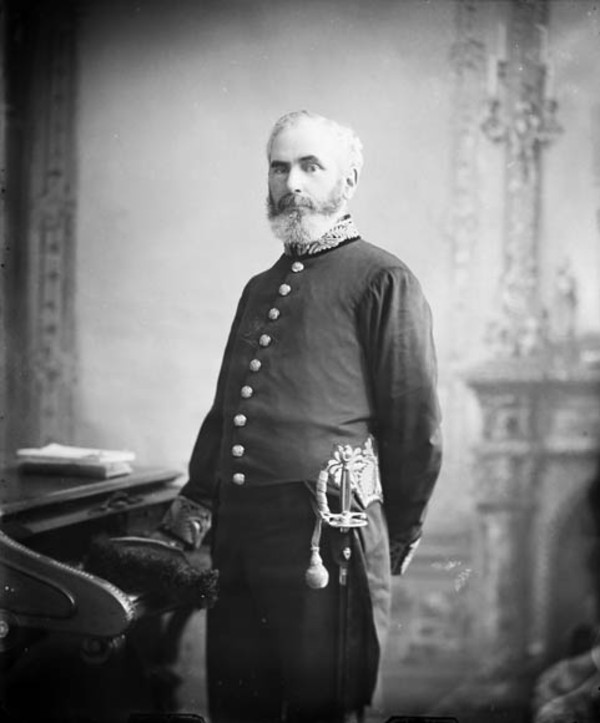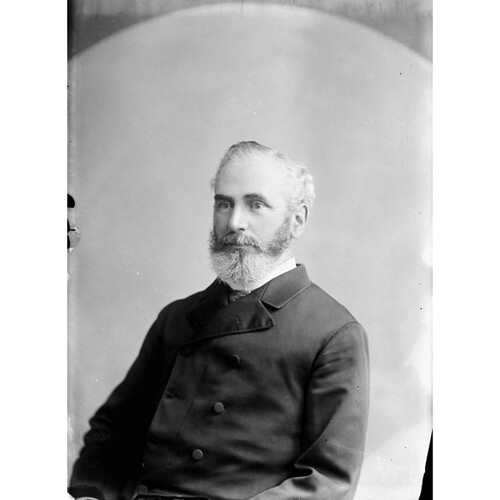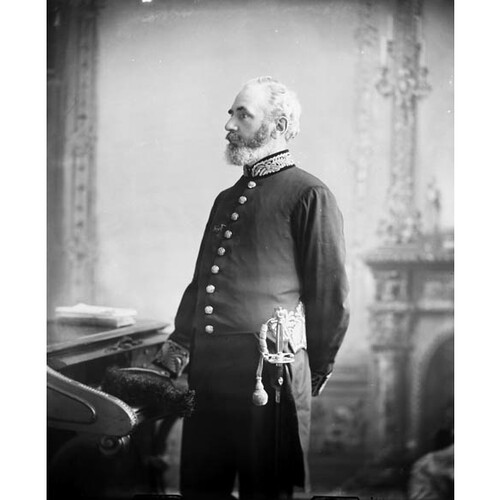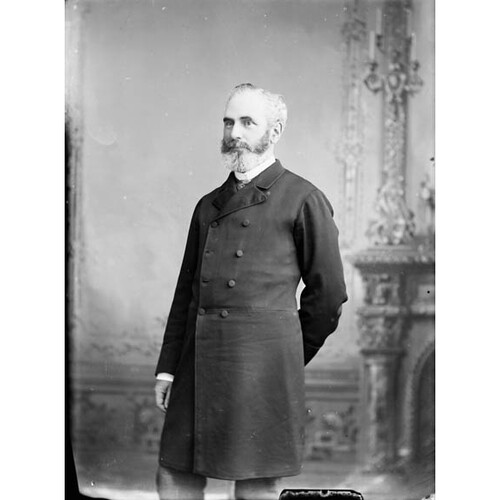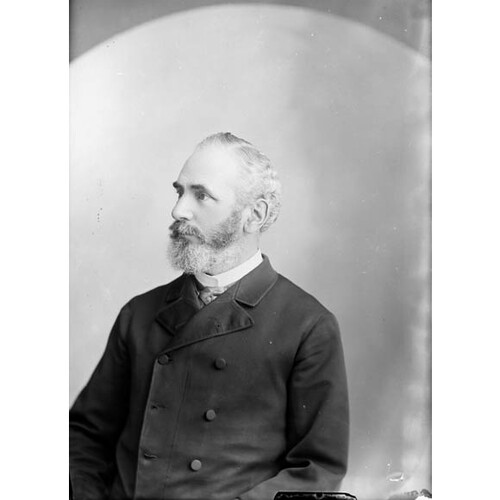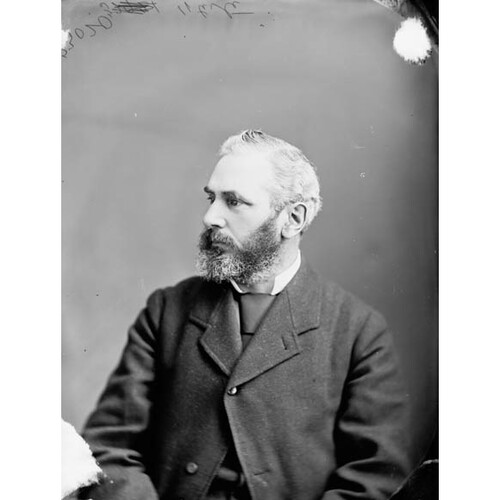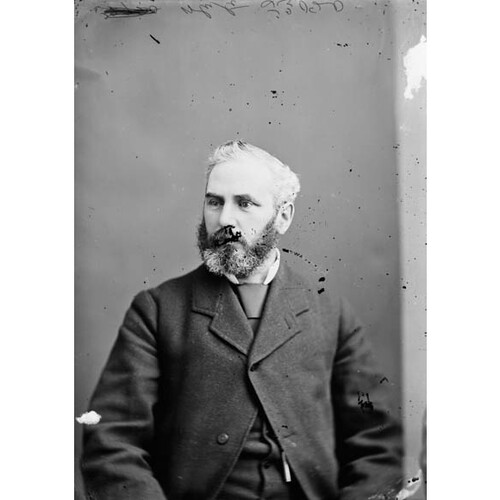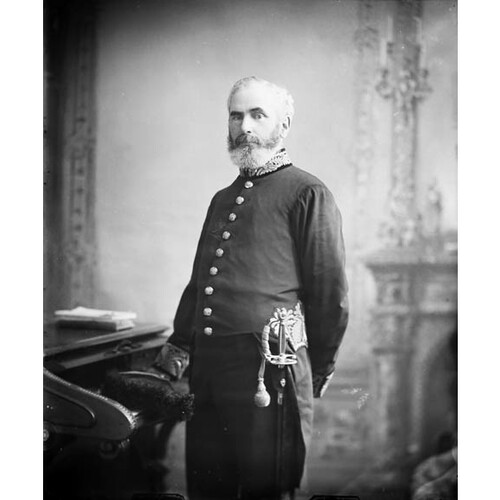WHITE, THOMAS, journalist and politician; b. 7 Aug. 1830 at Montreal, Lower Canada, elder son of Thomas White, originally from Westmeath County (Republic of Ireland), and Dorothea Smeaton; m. in 1853 Esther Vine of Quebec City, and they had seven daughters and three sons, among them Robert Smeaton*; d. 21 April 1888 at Ottawa, Ont.
Thomas White was educated at the High School of Montreal before following his father in the leather trade. In 1846 he began a three-year apprenticeship in the Montreal grocery firm of T. C. Panton. After his contract expired in May 1849, White worked as a clerk at Brantford and Peterborough in Canada West before settling in Toronto in 1850 where he learned the printing trade in the office of the queen’s printer. He moved to Quebec City when the office followed the government there the following year.
As a consequence of a temperance address White gave in Quebec City, in 1852 he was invited by the queen’s printer, Stewart Derbishire*, to join the editorial staff of the Canada Gazette. The next year White returned to Peterborough with his brother-in-law, Robert Romain, where they founded the Peterborough Review as a semi-weekly (later weekly). In 1855 his brother Richard joined him in Peterborough. Thomas was soon active in civic politics: he was elected reeve and then served on the Peterborough school board. In 1860 he decided to undertake the study of law and for the next four years worked in the law office of Sidney Smith. He seems to have preferred journalism to law, however, and in 1864, with the help and connivance of John A. Macdonald*, moved to Hamilton with his brother to take over the Daily Spectator and Journal of Commerce; an important Conservative daily, it had been founded 18 years earlier by Robert Reid Smiley*. Thomas White was to serve on the grammar school board while he lived in Hamilton.
White was an able journalist. He was unusually well informed, and blessed with a cool, transparent style devoid of affectation but lively and humorous. On the issue of confederation the Spectator was as close to Macdonald’s sentiments as any Conservative paper. It reflected his view that the principle of federation was a necessary but nevertheless dangerous American import; “it is some satisfaction to know that there were not wanting men in the [Quebec] Conference strongly wedded to the idea of simple legislative Union, and thoroughly alive to the dangers of the federal system. . . . The local Parliaments exercising these [local] functions by virtue of the privileges delegated to them, present a vastly different thing from the State Legislatures of the American Union.”
White ran in the Ontario provincial election of 1867 for Wentworth South and lost by three votes. When Thomas Sutherland Parker, mp for Wellington Centre, died on 24 Oct. 1868, there was talk that White might run in that constituency, but Macdonald and White himself thought it an unwise risk; when White ran again he must run to win. As it turned out, that was easier said than done.
In 1868 Macdonald planned to strengthen the Conservative organ in Toronto, the Leader, which was creaking along under James Beaty*, its founding editor, and Sir John A. considered replacing Beaty with White, but the project did not go through. No change was made until 1872, when a new paper, the Mail, was started in Toronto under Charles Belford*. In 1869 John Sandfield Macdonald*, the premier of Ontario, asked White to go to England as immigration agent for the province. White’s work in England seems to have met with considerable success. But he was soon needed again in Canada. Brown Chamberlin, the editor of the Montreal Gazette, the leading English-language Conservative paper, wanted out. Macdonald arranged that Chamberlin would become queen’s printer in Ottawa and Thomas and Richard White would then buy control of the Gazette Printing Company. They did so in 1870 and met with considerable success. During the 1870s Thomas White was a prominent member of the Montreal Board of Trade, serving on its executive committee for three years and representing it on the Dominion Board of Trade for a number of years.
The Gazette became a base for White’s growing importance in the Conservative ranks in Quebec. Although Sir George-Étienne Cartier* clearly did not take kindly to suggestions from White about Montreal patronage, Cartier’s reign was nearing an end. He was defeated in Montreal East in 1872 and died in May 1873, just as the Pacific Scandal was becoming an issue. At a meeting held on the Champ de Mars in Montreal on 5 August White tried to defend the Conservative government from attacks precipitated by the scandal, but found the going anything but easy. “How much did you get?” the crowd yelled at him. White probably had not got anything. He continued to try for a seat in the House of Commons. In the federal election of January 1874 he contested the riding of Prescott in Ontario but lost by six votes. On 19 Dec. 1874 he lost a by-election in Montreal West by seven votes, and when he contested the riding again on 30 Oct. 1875, he lost to Thomas Workman by 50 votes. It was a remarkable run of bad luck. The following December he refused to run in a by-election in Argenteuil, Que., considering the possibility of winning hopeless.
Nevertheless White was by this time an important figure in the Conservative party of Quebec. The premier, Charles-Eugène Boucher* de Boucherville, and his treasurer, Levi Ruggles Church*, found their government in financial trouble; in 1876 the province’s deficit amounted to approximately $600,000, most of which could be attributed to shaky railway financing. Unable to agree about how to proceed, they turned to a high-powered committee of Conservatives to arrange a way out: White was one of the group, with Macdonald, Narcisse-Fortunat Belleau*, Sir Hector-Louis Langevin*, and Louis-François-Roderick Masson*, and he worked closely with the treasurer.
The Gazette had always been a power within, and even outside, the party and was now more than ever before becoming the principal Conservative organ in the country. By the 1880s it was considered by no less an authority than Charles Herbert Mackintosh*, editor of the Ottawa Daily Citizen, to be second to none in Canada. White regularly wrote the paper’s parliamentary reports from Ottawa during the 1870s with his usual mixture of suavity and authority. But, although he strongly supported the National Policy, he was never a rabid partisan. The Gazette’s editorial on Edward Blake*’s Aurora speech of 3 Oct. 1874 is a good example of White’s judiciousness. It concluded: “We prefer to regard the speech as another added to the many evidences which surround us of the advancement and prosperity of this country. . . . There is leisure for speculative politicians to air their doctrines, and there is fortunately culture enough to appreciate and weigh their value.” White could also be amusing about Blake: shortly before Blake became leader of the Liberal party in April 1880, White wrote, “In fact, Mr. Blake differs with everybody but Mr. Blake and he does not always agree with him . . . .”
White was now in parliament. He had been elected to the House of Commons in the general election of October 1878 for the Ontario riding of Cardwell; well might his triumphant return to Montreal be celebrated with a torchlight parade from Bonaventure Station. He was soon to become an important figure on the Conservative benches. A graceful, polished, indeed telling speaker, he gave the impression, usually a correct one, that he was master of his subject. White was certainly cabinet timber; he was, however, a Montrealer sitting for an Ontario riding and this complication undoubtedly delayed his appointment. It was characteristic of his range of talent that in the summer of 1885 he was appointed minister of the interior, a portfolio dealing almost exclusively with the west. White was the right man in the right place, and it was a pity he had not been appointed two years earlier, instead of having to pick up the pieces after the North-West rebellion. He had a tremendous capacity for work, a great span of knowledge, and a thick seam of common sense. Practically the first thing he did was to go to the North-West Territories in September and investigate for himself. A series of recommendations followed, including the suggestions that the preemption payments, due in 1885 to the federal government by the Métis for land, should be postponed for a year at least, and that William Pearce*, who had earned good opinions in Prince Albert (Sask.), should be sent to Batoche to seek out and settle the claims of the Métis there. The following summer White was on the Pacific coast, preceding Macdonald’s visit there by a month. In 1887 a series of legislative measures began when the North-West Territories were given representation in parliament and Banff National Park was established. White was almost too successful a minister, for in October 1887 he was given the additional portfolio of superintendent general of Indian Affairs which Macdonald had held since 1878.
White was a remarkably painstaking and conscientious minister of the interior. He worked like a Trojan to understand the west, to master its problems. One mp from the northwest said all that needed to be said: “We trusted him, for he had no purpose to serve save that of the country.” By 1888 White was already being considered as the man to succeed Sir Charles Tupper* in the finance portfolio; there was even talk that in time he might just be the successor to Macdonald himself. About 15 April 1888, however, White was taken ill with a bad cold, and, perhaps exhausted from overwork, he developed pneumonia. Even then, on 18 April he insisted on discussing Indian affairs with Edgar Dewdney*, the lieutenant governor of the North-West Territories, who was in Ottawa. White’s pneumonia grew worse and he died on 21 April.
White’s death stunned Macdonald. They had always been close, and White was one of the few men whom Macdonald addressed by his first name. When parliament resumed on 23 April the old man struggled manfully to his feet, determined to master his emotions and move the adjournment of the house himself. His efforts in vain, he collapsed at his desk in tears. Langevin had to move the adjournment and Wilfrid Laurier* seconded it. Laurier and White had found much to admire in each other, and Laurier’s graceful speech that day was long remembered. The serious nature of White’s loss to public service was revealed in the emptiness of speculation about a successor in office. And, as Sara Jeannette Duncan* concluded in her tribute to White in the Week, “on the streets and the corners of the streets, where the winter drifts still baffle the chilly sunshine and a few blades of green are disheartenedly looking for spring, men stand in transient groups of twos and threes and turn over the memories of his kindly deeds, his painstaking service, his upright behaviour . . . .” There are good men in politics.
[There is no known collection of Thomas White papers. The Macdonald papers at the PAC (MG 26, A, 296) contain his letters to Macdonald from the 1860s through to 1888, and some of his letters turn up in other ministerial collections of the time. His ideas and his writing are seen in the Gazette (Montreal), the Hamilton Spectator, and the Peterborough Rev. (Peterborough, Ont.), and he was the author of An exhibit of the progress, position and resources, of the County of Peterboro’, Canada West, based upon the census of 1861 . . . (Peterborough, [1861?]) and of Our great west: a lecture delivered under the auspices of the Young Men’s Christian Association of Christ Church Cathedral, on the evening of the 27th February, 1873 (Montreal, 1873). Lengthy obituaries appeared on 23 April 1888 in the Daily Sun (Saint John, N.B.), the Gazette (Montreal), the Morning Herald (Halifax), the Toronto Daily Mail, and several other papers, and there are biographical sketches in Cyclopædia of Canadian biog. (Rose, 1886), the Canadian biog. dict., II: 36–38, and the DNB. There is an appreciation of White by Sara Jeannette Duncan in her column “Ottawa letter,” in the Week (Toronto), 26 April 1888, and there are numerous references to him in Creighton, Macdonald, old chieftain and in Rumilly, Hist. de la prov. de Québec, I-V. A full appreciation of White’s work and career still remains to be done. p.b.w.]
Cite This Article
P. B. Waite, “WHITE, THOMAS (1830-88),” in Dictionary of Canadian Biography, vol. 11, University of Toronto/Université Laval, 2003–, accessed January 2, 2026, https://www.biographi.ca/en/bio/white_thomas_1830_88_11E.html.
The citation above shows the format for footnotes and endnotes according to the Chicago manual of style (16th edition). Information to be used in other citation formats:
| Permalink: | https://www.biographi.ca/en/bio/white_thomas_1830_88_11E.html |
| Author of Article: | P. B. Waite |
| Title of Article: | WHITE, THOMAS (1830-88) |
| Publication Name: | Dictionary of Canadian Biography, vol. 11 |
| Publisher: | University of Toronto/Université Laval |
| Year of publication: | 1982 |
| Year of revision: | 1982 |
| Access Date: | January 2, 2026 |


